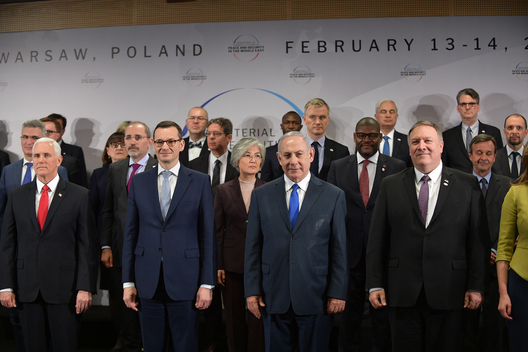 It is too early to assess the long-term consequences of the Ministerial to Promote a Future of Peace and Security in the Middle East. But for Poland and several other actors, the meeting can already been seen as a success.
It is too early to assess the long-term consequences of the Ministerial to Promote a Future of Peace and Security in the Middle East. But for Poland and several other actors, the meeting can already been seen as a success.
Poland, after hosting a NATO summit in 2016 and a UN Climate conference in 2018, has once again shown that it is able to organize large international events.
Israeli Prime Minister Benjamin Netanyahu, who used the meeting to improve his chances in upcoming parliamentary elections, focused on the presence of a number of Arab countries to demonstrate solidarity against Iran—even if at the same time he offended his Polish hosts by commenting on Poland’s role during the Holocaust.
After the summit, Polish Foreign Affairs Minister Jacek Czaputowicz said, “Poland had an opportunity to present itself as a member of the UN Security Council, working toward peace and security.” He played down the significance of the fact that The High Representative of the Union for Foreign Affairs and Security PolicyFederica Mogherini did not attend; Czaputowicz explained that Mogherini was at a NATO meeting of defense ministers in Brussels at the same time. Her absence could hardly be considered as a surprise since West European states—despite tensions with Iran over human rights, ballistic missiles and the activities of Iranian security services—reject the US withdrawal from the Iran nuclear deal and the resumption of economic sanctions.
From the very beginning, Poland tried to neutralize the feeling that the Warsaw summit was purely anti-Iranian and ultimately this goal was achieved despite hawkish speeches from both US Vice President Mike Pence and Netanyahu. A final joint Polish-US statement did not mention Iran at all. At the same time, it was clearly signaled that the Warsaw meeting was not intended to be a one-off event. Poland hopes that a so-called Warsaw Process was born and that it could contribute to peace in the Middle East.
While few details have been revealed, topics discussed included regional tensions, the conflicts in Syria and Yemen, humanitarian issues, WMD proliferation, terrorism, hybrid challenges and energy security. It was announced that working groups would be established in the near future and that Polish and US think tanks would “convene a global forum of experts, the Middle East Strategic Study Group. This forum can enable leading academics and issue experts from across the world to provide strategic insight to support the continued efforts of the working groups.” As a Warsaw-based think-tank, the Pulaski Foundation noted, “It seems that there is now an attempt to replace the current format of international discussions on the Middle East, the so called Madrid Quartet (UN, US, EU, Russia) which, due to conflicting interests of its members, actually ceased to exist.”
There are obvious questions about whether this ambition can be realized. We are witnessing the emergence of two rival geopolitical camps in the Middle East—one led by the US and one comprising Iran, Russia and, at least temporarily, Turkey. President Donald Trump’s son-in-law and adviser Jared Kushner attended the Warsaw summit but has yet to present an Israeli-Palestinian peace plan that he has been working on for years. Also, the event did not bring about any breakthroughs in ending the Saudi and Emirati boycott of Qatar. At the same time, nearly a dozen Arab states attended the Warsaw event—despite a Palestinian call to boycott it. That was a clear victory for Israel, which increased its regional legitimacy.
The US, which came up with the idea for the summit, has pronounced it a success in view of the fact that seventy nations attended, albeit at varying levels of representation. Just days before the meeting, Iranian Ambassador to Poland Masoud Edrisi Kermanshahi said at a reception on the occasion of the forty anniversary of the Islamic Revolution that the US is now isolated. For the White House, the main goal of the conference was to consolidate a US-Israel-Arab camp against Iran. The US used the Warsaw summit to clearly present its goals and demonstrate how many states—both actively and passively—supported this vision.
Poland tried to act as a neutral player, and to some degree it succeeded, at least vis-a-vis Iran. The summit, in the end, did not appear to increase tensions between the two countries. In fact, Iranian media concentrated on criticizing the US while Poland was largely spared.
Paradoxically, a negative outcome for Poland was a drastic cooling of Polish-Israeli relations and a deterioration of the US image in Polish public opinion. Netanyahu offended Poles by trying to convert the summit into an anti-Iranian event and said openly that the main goal was “to advance the common interest of the war with Iran,” which was later said to be a mistranslation of the word, “conflict.” Then he said that “Poles cooperated with the Germans during the Holocaust.” These words are very offensive for a country that was occupied by Nazi Germany between 1939-1945 and lost six million of its citizens. Israel Katz, currently acting as Israeli foreign minister, made matters worse when he said that Poles “suckle anti-Semitism with their mother’s milk.” After such racist comments, the V4 Group—Hungary, Poland, the Czech Republic and Slovaki—cancelled a planned meeting in Jerusalem.
Robert Czulda is an assistant professor at the University of Lodz, Poland and a former visiting professor at Islamic Azad University in Iran, the University of Maryland and National Cheng-chi University in Taiwan. He is the author of Iran 1925 – 2014: From Reza Shah to Rouhani. Follow him on Twitter: @RobertCzulda.
Image: US Secretary of State Mike Pompeo and Israeli Prime Minister Benjamin Netanyahu participate in the Warsaw Summit on February 14, 2019 (State Department)
